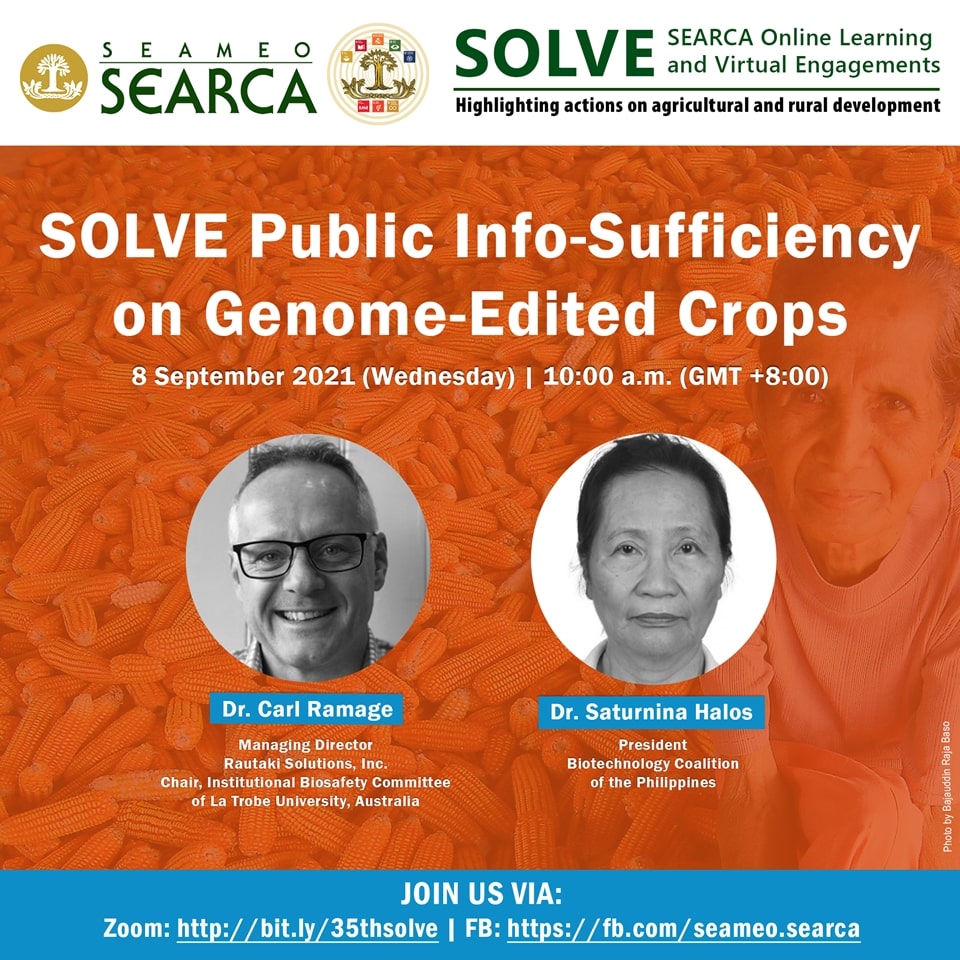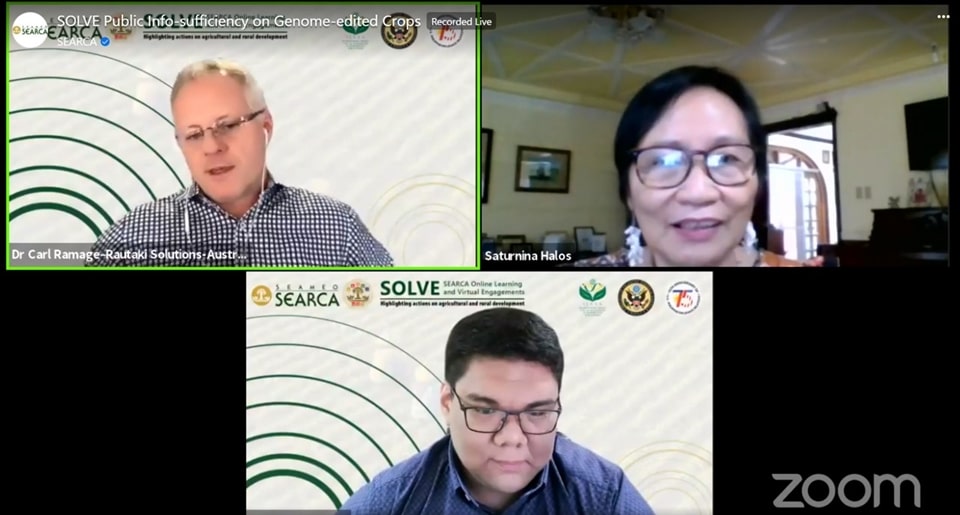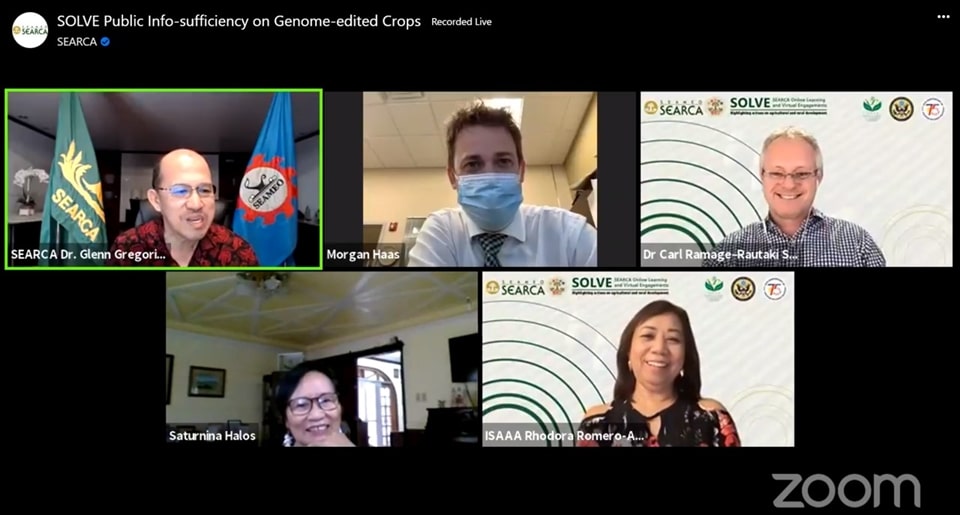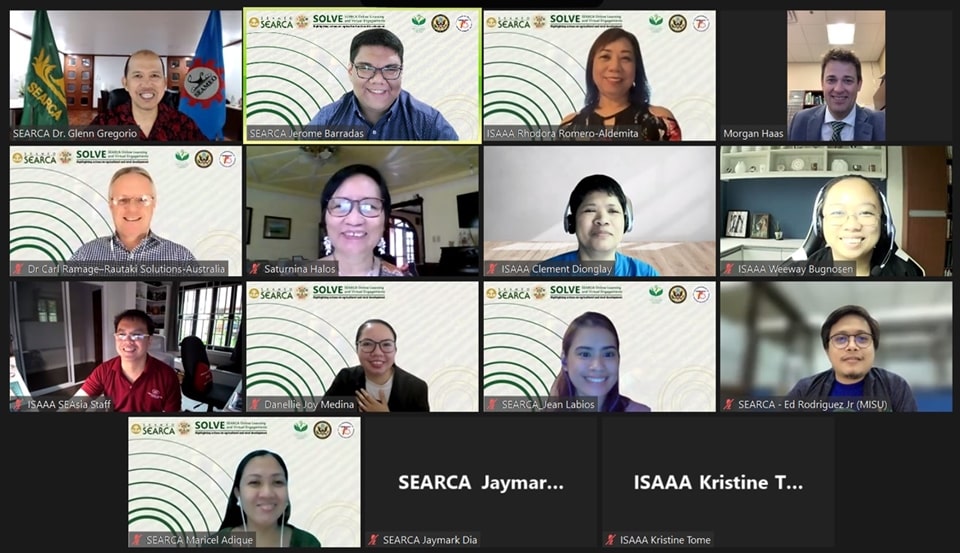
SEARCA teamed up with the USDA Foreign Agricultural Service, United States Embassy Manila, and the International Service for the Acquisition of Agri-biotech Applications (ISAAA) for the 35th SEARCA Online Learning and Virtual Engagement (SOLVE) webinar entitled “SOLVE Public Info-sufficiency on Genome-edited Crops” held on 8 September 2021 via Zoom and Facebook. The webinar is part of the annual Biotech Outreach Program, which aims to provide a venue for knowledge sharing and learning with different stakeholders and contribute to improved understanding and acceptance of biotechnology in the country, with focus on genome editing technologies in crops.
Dr. Carl Ramage, Managing Director of Rautaki Solutions, Inc., and Chair of the Institutional Biosafety Committee of La Trobe University, Australia; and Dr. Saturnina Halos, President of the Biotechnology Coalition of the Philippines presented the global and local perspectives on genome editing (GE) technologies and biosafety regulations, respectively.
Dr. Ramage pointed out that gene editing is just one of the technologies in the biotech toolbox that can be used to improve farm productivity and mitigate the effects of climate change. He shared several examples of GE regulatory approaches implemented in other countries such as Argentina and the United States. He also mentioned that the commercialization of gene-edited products depends on a clear pathway to market; an effective value capture model; and clear and harmonized regulatory requirements.
“We should not fear new technology. We should keep asking scientists and the government questions to ensure that we maintain the safety of the food that we eat and produce,” Dr. Ramage said. “Be part of the discussion, take an open mind, listen, and contribute,” he concluded.
 Project Coordinator II from SEARCA’s Research and Thought Leadership Department (RTLD), Mr. Jerome C. Barradas (below) along with resource speakers, Dr. Carl Ramage (left) and Dr. Saturnina Halos (right) during the open forum.
Project Coordinator II from SEARCA’s Research and Thought Leadership Department (RTLD), Mr. Jerome C. Barradas (below) along with resource speakers, Dr. Carl Ramage (left) and Dr. Saturnina Halos (right) during the open forum.
Meanwhile, Dr. Halos discussed the opportunities and constraints of GE in the Philippines. She informed the group that the National Committee on Biosafety of the Philippines (NCPB) has ruled that gene-edited crops will not be regulated under the existing guidelines covering GMOs (genetically modified organisms) She further clarified that the current Philippine regulation on modern biotechnology, which is based on the Cartegena Protocol, is specific only to GMOs. Dr. Halos also mentioned that there is government support for molecular breeding using gene editing led by the Department of Agriculture.
“We should not stop exploring new methods of improving agriculture because we are in a different situation today than we are a hundred years ago. For instance, climate change is affecting everything,” Dr. Halos noted.
She also concurred with Dr. Ramage. “We should be open to new technologies that could help us. We must be aware that these products can cause damage, thus, there are regulations put in place. We’ve had GMOs for more than 20 years and because of the science-based biosafety regulations, they have been proven to be safe for humans and the environment,” Dr. Halos added.
In his closing message, SEARCA Director, Dr. Glenn B. Gregorio, emphasized the importance of gene-editing applications for crops and the need for regulatory frameworks that are science and evidence-based.
A plant breeder, geneticist, and professor at the University of the Philippines Los Baños (UPLB) by profession, Dr. Gregorio also underlined the significance of spreading the word about the benefits of these technologies. “We can clearly see and appreciate how modern biotechnology as an agricultural innovation accelerates transformation. We are in the age where crop breeding innovations and gene-edited products are highly relevant now more than ever,” he stated.
 SEARCA Director, Dr. Glenn B. Gregorio giving his closing message during the webinar. Also joining him is the Agricultural Counselor of the USDA Foreign Agricultural Service, Mr. Morgan Haas; Dr. Ramage; Dr. Halos; and Dr. Rhodora R. Aldemita, Director of ISAAA’s Southeast Asia Center.
SEARCA Director, Dr. Glenn B. Gregorio giving his closing message during the webinar. Also joining him is the Agricultural Counselor of the USDA Foreign Agricultural Service, Mr. Morgan Haas; Dr. Ramage; Dr. Halos; and Dr. Rhodora R. Aldemita, Director of ISAAA’s Southeast Asia Center.
For almost half a decade, the United States Department of Agriculture together with the Southeast Asian Regional Center for Graduate Study and Research in Agriculture, International Service for the Acquisition of Agri-biotech Applications, and its strong network of partners have been leading and organizing the annual Biotech Outreach Program. This year's webinar was attended by more than a hundred participants via Zoom with more than 1,400 views on Facebook. While majority of the attendees came from the Philippines, participants from Myanmar, Japan, Timor Leste, and Indonesia also joined in the discussions.
 The resource speakers together with the organizing team from SEARCA and ISAAA.
The resource speakers together with the organizing team from SEARCA and ISAAA.